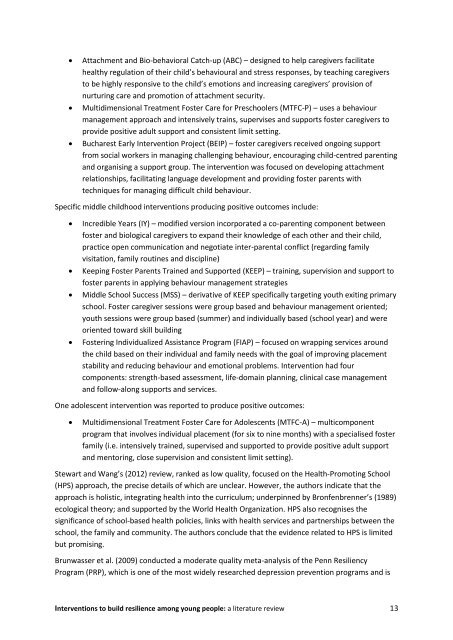Interventions to build resilience among young people A literature review
Interventions-to-build-resilience-among-young-people
Interventions-to-build-resilience-among-young-people
You also want an ePaper? Increase the reach of your titles
YUMPU automatically turns print PDFs into web optimized ePapers that Google loves.
Attachment and Bio-behavioral Catch-up (ABC) – designed <strong>to</strong> help caregivers facilitate<br />
healthy regulation of their child’s behavioural and stress responses, by teaching caregivers<br />
<strong>to</strong> be highly responsive <strong>to</strong> the child’s emotions and increasing caregivers’ provision of<br />
nurturing care and promotion of attachment security.<br />
Multidimensional Treatment Foster Care for Preschoolers (MTFC-P) – uses a behaviour<br />
management approach and intensively trains, supervises and supports foster caregivers <strong>to</strong><br />
provide positive adult support and consistent limit setting.<br />
Bucharest Early Intervention Project (BEIP) – foster caregivers received ongoing support<br />
from social workers in managing challenging behaviour, encouraging child-centred parenting<br />
and organising a support group. The intervention was focused on developing attachment<br />
relationships, facilitating language development and providing foster parents with<br />
techniques for managing difficult child behaviour.<br />
Specific middle childhood interventions producing positive outcomes include:<br />
<br />
<br />
<br />
<br />
Incredible Years (IY) – modified version incorporated a co-parenting component between<br />
foster and biological caregivers <strong>to</strong> expand their knowledge of each other and their child,<br />
practice open communication and negotiate inter-parental conflict (regarding family<br />
visitation, family routines and discipline)<br />
Keeping Foster Parents Trained and Supported (KEEP) – training, supervision and support <strong>to</strong><br />
foster parents in applying behaviour management strategies<br />
Middle School Success (MSS) – derivative of KEEP specifically targeting youth exiting primary<br />
school. Foster caregiver sessions were group based and behaviour management oriented;<br />
youth sessions were group based (summer) and individually based (school year) and were<br />
oriented <strong>to</strong>ward skill <strong>build</strong>ing<br />
Fostering Individualized Assistance Program (FIAP) – focused on wrapping services around<br />
the child based on their individual and family needs with the goal of improving placement<br />
stability and reducing behaviour and emotional problems. Intervention had four<br />
components: strength-based assessment, life-domain planning, clinical case management<br />
and follow-along supports and services.<br />
One adolescent intervention was reported <strong>to</strong> produce positive outcomes:<br />
<br />
Multidimensional Treatment Foster Care for Adolescents (MTFC-A) – multicomponent<br />
program that involves individual placement (for six <strong>to</strong> nine months) with a specialised foster<br />
family (i.e. intensively trained, supervised and supported <strong>to</strong> provide positive adult support<br />
and men<strong>to</strong>ring, close supervision and consistent limit setting).<br />
Stewart and Wang’s (2012) <strong>review</strong>, ranked as low quality, focused on the Health-Promoting School<br />
(HPS) approach, the precise details of which are unclear. However, the authors indicate that the<br />
approach is holistic, integrating health in<strong>to</strong> the curriculum; underpinned by Bronfenbrenner’s (1989)<br />
ecological theory; and supported by the World Health Organization. HPS also recognises the<br />
significance of school-based health policies, links with health services and partnerships between the<br />
school, the family and community. The authors conclude that the evidence related <strong>to</strong> HPS is limited<br />
but promising.<br />
Brunwasser et al. (2009) conducted a moderate quality meta-analysis of the Penn Resiliency<br />
Program (PRP), which is one of the most widely researched depression prevention programs and is<br />
<strong>Interventions</strong> <strong>to</strong> <strong>build</strong> <strong>resilience</strong> <strong>among</strong> <strong>young</strong> <strong>people</strong>: a <strong>literature</strong> <strong>review</strong> 13


